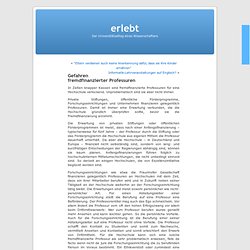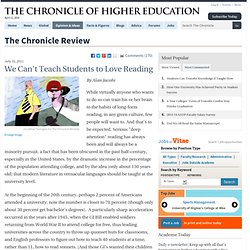

#Pedagogics | #politics #ideology #economy| 02myEduAcad03_201109. Journal: Distance Education, Vol. 32, No. 1 now available. Tony Bates. "[...]Die Erwartung von privaten Stiftungen oder öffentlichen Förderprogrammen..." Gefahren fremdfinanzierter Professuren « erlebt. In Zeiten knapper Kassen sind fremdfinanzierte Professuren für eine Hochschule verlockend.

Unproblematisch sind sie aber nicht immer. Private Stiftungen, öffentliche Förderprogramme, Forschungseinrichtungen und Unternehmen finanzieren gelegentlich Professuren. Damit ist immer eine Erwartung verbunden, die die Hochschule gründlich überprüfen sollte, bevor sie die Fremdfinanzierung annimmt. Die Erwartung von privaten Stiftungen oder öffentlichen Förderprogrammen ist meist, dass nach einer Anfangsfinanzierung – typischerweise für fünf Jahre – der Professur durch die Stiftung oder das Förderprogramm die Hochschule aus eigenen Mitteln die Professur dauerhaft unterhält.
Da aber die Hochschule – in Deutschland und Europa – finanziell nicht selbständig sind, sondern von lang- und kurzfristigen Entscheidungen der Regierungen abhängig sind, können sie kaum planen. Was tun? Tags: Ethik, Wissenschaftsethik. We Can't Teach Students to Love Reading. By Alan Jacobs While virtually anyone who wants to do so can train his or her brain to the habits of long-form reading, in any given culture, few people will want to.

And that's to be expected. Serious "deep attention" reading has always been and will always be a minority pursuit, a fact that has been obscured in the past half-century, especially in the United States, by the dramatic increase in the percentage of the population attending college, and by the idea (only about 150 years old) that modern literature in vernacular languages should be taught at the university level. At the beginning of the 20th century, perhaps 2 percent of Americans attended a university; now the number is closer to 70 percent (though only about 30 percent get bachelor's degrees).
The extreme reader, to coin a phrase, is a rare bird indeed. Those are my tribe, but they are few. Perhaps it isn't anyone's fault. So what did those poor deluged people do? Alan Jacobs is a professor of English at Wheaton College. Education Management Corporation Accused of Widespread Fraud. While the civil lawsuit is one of many raising similar charges against the expanding for-profit college industry, the case is the first in which the government intervened to back whistle-blowers’ claims that a company consistently violated federal law by paying recruiters based on how many students it enrolled.

The suit said that each year, Education Management falsely certified that it was complying with the law, making it eligible to receive student financial aid. “The depth and breadth of the fraud laid out in the complaint are astonishing,” said Harry Litman, a lawyer in Pittsburgh and former federal prosecutor who is one of those representing the two whistle-blowers whose 2007 complaints spurred the suit. “It spans the entire company — from the ground level in over 100 separate institutions up to the most senior management — and accounts for nearly all the revenues the company has realized since 2003.”
In a statement Monday, the company denied any wrongdoing.